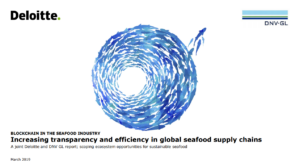Blockchain could boost transparency of the aquaculture sector by providing a means to trace and record the entire fish supply chain, according to a new report by DNV GL and Deloitte. The report suggests that data from the ‘bait to plate’ could be stored in a publicly available blockchain, which will help to appease public, industry and consumer concerns about sustainability and food safety.
Blockchain could offer a way of improving confidence in the industry and its products. As a decentralized database that is based on well-established cryptographic principles that allow for the recording of unalterable transactions logs, it may serve to create transparency and establish trust in sustainable fishing sources and practices.
If the fish was produced on a farm, the owner could upload information about the farm itself, e.g. a code of conduct, or information about people and fish welfare. The blockchain could also be used to record the composition of the feed and water conditions. Fish caught at sea could be tagged with the location of the trawler and the fishing method, storage conditions (temperate, humidity) could also be logged.
Similar information could then be collated in the processing plant and transportation to the supermarket shelf. At the point of purchase, the consumer would be able to scan a smart label and get instant access to this information.
The potential benefits of making data available on a blockchain go beyond the consumer. The transparency of the supply chain increases the effectiveness of audits and communication between different parts of the supply chain. Financial institutions and insurance companies will get a much clearer insight into operations and will therefore be able to tailor their products accordingly; public administrations would be able to improve their license management and monitoring.
However, to achieve the complete data trail, significant barriers must be overcome, such as commonly low degrees of digital maturity and some key player’s reluctance to share information, the report adds.
The authors of the study conducted interviews with stakeholders across the whole supply chain and found several barriers to the uptake of blockchain. There is already extensive record keeping but traceability data has not been prioritized and companies are often reluctant to share that information. Currently, it is often kept in siloed legacy systems.
The business case is not yet clear enough for companies to make the investment, and the potential value of data in a blockchain is not fully understood.
Key challenges include:
- Data and information flow
- Reputational risk
- Transparency and consumer engagement
Explore more herebelow:































































